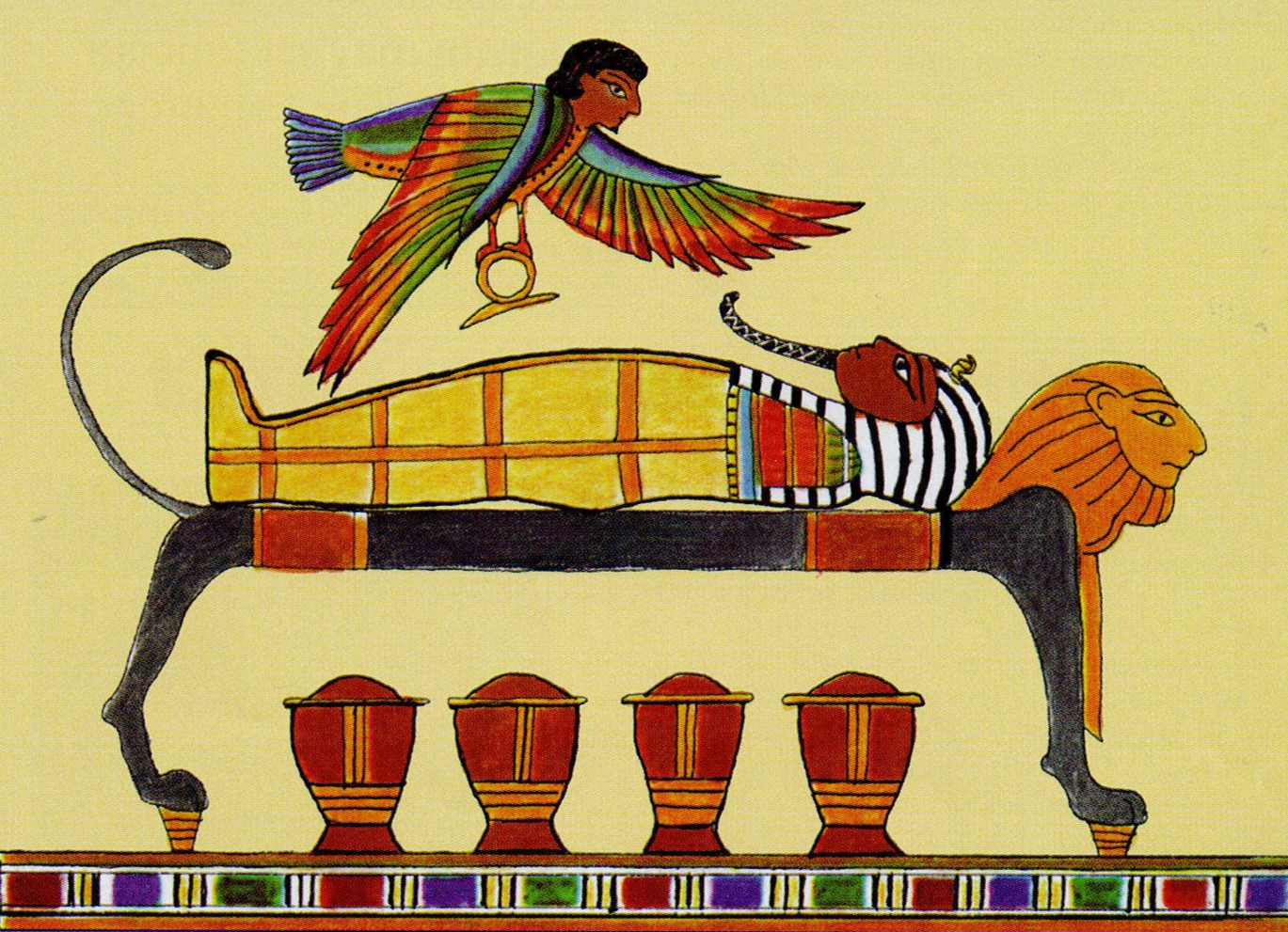The Immortal Soul – True or False?
Church Teaching
Most churches teach that every person possesses an immortal soul, which is distinct from the body of the person. For example the London Baptist Confession of Faith:
 The bodies of men after death return to dust, and see corruption but their souls, which neither die nor sleep, having an immortal subsistence, immediately return to God who gave them. “The souls of the righteous being then made perfect in holiness, are received into paradise, where they are with Christ, and behold the face of God in light and glory, waiting for the full redemption of their bodies; and the souls of the wicked are cast into hell; where they remain in torment and utter darkness, reserved to the judgment of the great day;”
The bodies of men after death return to dust, and see corruption but their souls, which neither die nor sleep, having an immortal subsistence, immediately return to God who gave them. “The souls of the righteous being then made perfect in holiness, are received into paradise, where they are with Christ, and behold the face of God in light and glory, waiting for the full redemption of their bodies; and the souls of the wicked are cast into hell; where they remain in torment and utter darkness, reserved to the judgment of the great day;”
What does the Bible teach? Its perhaps a surprise, but the Bible does not teach that people have an immortal soul, or go to heaven or go to hell at death. Lets take this step by step. What does the Bible teach about death?
The Death State
The Bible teaches that when a person dies they are unconscious, knowing nothing, and are as though they never lived.
Eccl 9:5-6 “The dead know not anything … their love their hatred their envy is perished …”
Eccl 9:10 “There is no work … nor knowledge, nor wisdom in the grave”
Psalm 6:5 “In death there is no remembrance”
Psalm 146:4 “His breath goeth forth … in that day his thoughts perish”
Man does not possess immortality
If man did have immortality then the following contradictions would arise:
- Men would not perish like the beasts (Psa 49:14, 19-20)
- Immortality would not be only for the righteous (Rom 2:6-8)
- Immortality would not be a gift of God (Rom 6:23)
- Immortality would not be dependant on belief in Jesus Christ (John 6:40, 11:25)
- There would be no need for a resurrection (1 Cor 15:16-18)
What the Bible says about Souls
The word “Soul” in the Bible primarily means a “breathing creature”, a “body capable of life, – in man or beast. The term is also used of various attributes and aspects of the body.
“Soul” in the Old Testament
The word translated “Soul” in the OT is the Hebrew word “Nephesh”, which occurs 754 times and is translated variously “Soul” (472 times), “Living” 119 times, “Person” 30 times.
The word is used 326 times in contexts where it is evident that it is subject to death. For example:
Ezek 18:20 “The soul that sinneth it shall die”
Psalm 40:14 “That seek after my soul to destroy it”
Joshua 10:28 “… he utterly destroyed … all the souls”
Adam is described as becoming a living soul at creation –
Gen 2:7 “God breathed into his nostrils the breath of life; and man became a living soul (Nephesh)”
Soul (Heb “Nephesh”) is also used of the animal creation
Gen 1:20“..the moving creature that hath life (Nephesh – Soul)
Gen 1:21 “God created every living creature (Nephesh – Soul)
Gen 1:24“Let the earth bring forth the living creature (Nephesh – Soul)
“Soul” in the New Testament
The word translated “Soul” in the NT is the Greek word “Psuche”, which occurs 106 times and is translated variously “Soul” (58 times), “life” 40 times, mind 3 times.
The word is used 45 times in contexts where it is evident that it is subject to death. For example:
James 5:20 “.. he which converteth a sinner … saveth a soul from death”
Acts 3:23 “.. every soul that will not hear that prophet shall be destroyed..”
Rev 16:3 “.. every living soul died in the sea”
Souls are not once described as immortal
The expression “immortal soul” is not found anywhere in the Bible. Nowhere in the Bible is the “Soul” ever described as immortal. Yet if the doctrine of possession of an immortal soul were true, surely somewhere in the Bible the soul would be so described. The words “immortal” or “immortality” are used few times in the Bible and always refer to God or those who are resurrected at Christ’s return.
- “Immortal” – occurs once – 1 Tim 1:17
- “Immortality” – occurs 5 times – Rom 2:7, 1 Cor 15:53&54, 1 Tim 6:16, 2 Tim 1:10
Bible quotes Churches use to support the teaching of the immortal soul
Bible passages sometimes quoted about going to Heaven
John 14:2-3 (ESV) “In my Father’s house are many rooms. If it were not so, would I have told you that I go to prepare a place for you? And if I go and prepare a place for you, I will come again and will take you to myself, that where I am you may be also”
These words of Jesus are sometimes quoted to prove that God has a big house in heaven and this is where peoples souls go when they die. However this is not really what these verses teach.
- The term “Father’s House” is never used of heaven, but is often used of the temple at Jerusalem – eg: John 2:16 “And said unto them that sold doves, Take these things hence; make not my Father’s house an house of merchandise.”
- Jesus is talking not of people coming up to him in heaven but of him going to people on earth (v3)
- The passage is referring to Christ having places prepared for the righteous in the temple that he will build on earth when he returns (Ezekiel’s temple)
Luke 23:43 Jesus speaking to the thief on the cross. “Truly, I say to you, today you will be with me in paradise.” (Luke 23:43)
Some think Jesus is telling the repentant thief that he will be in heaven with Jesus that very day. However it doesn’t teach that at all.
- Jesus cannot be promising the thief that he would be with him in heaven that day because Jesus wasn’t in heaven that day. He didn’t go to heaven till after he was resurrected (3 days after he died). After Jesus was resurrected he met Mary Magdalene and in John 20:17 it is recorded that he said to her “Touch me not, for I am not yet ascended to my Father“. So Jesus didn’t go to heaven the day that he he died. It wasn’t till 3 days later that he went to heaven.
- Jesus refers to “Paradise” but does not say that this is Heaven. The word “paradise” is a Persian word meaning a grand walled garden. It is used in Rev 2:7 of the garden that will exist when Jesus Christ returns to the earth.
- The thief did not request to go to heaven, but to be remembered when Jesus came again “Jesus, remember me when you come into your kingdom.” (v42)
- The answer is that the comma should be placed after the word “today” (Because there is no punctuation in the original Greek text of the New Testament, the translators of the Bible have to choose where to put punctuation marks). It should read Truly, I say to you today, you will be with me in paradise. Jesus was agreeing to the thief’s request to be with him when he comes again in his kingdom. The expression “I say to you today” is a statement of the certainty of what is being said. Moses did the same thing. eg: Deut 4:39 “Know therefore this day, …the LORD he is God in heaven above.” Hence Jesus is giving the repentant thief a firm assurance that he will be in Jesus’ coming kingdom.
Origin of the doctrine of the Immortal Soul
The doctrine of the immortal soul has come from pagan mythology and been adopted into Christianity in the second and third centuries. The following quotations establish that this is well known.
“The immortality of the soul is a doctrine of heathen origin. It was held by the Pagan priests of Chaldea, Babylonia, and Egypt, centuries before the Christian era, and by Pythagoras, the philosopher, who taught the pre-existence and transmigration of souls. After him it was taught by Socrates, a most celebrated heathen philosopher, and after him by Plato and the Platonists, from which sect sprang some of the earliest heresies of the Christian Church of the first four centuries.” (Rev. G. Waller, Biblical View of the Soul, p. 65)
“The Egyptians were the first who asserted the doctrine that the soul of man is immortal” (Herodotus “Euterpe” II, p123)
“Careful attention to the origin of the doctrine of the necessary immortality or indestructibility of each human soul, as stated for instance by Augustine or Aquinas, will probably convince us that it was not part of the original Christian message… It was rather a speculation of Platonism taking possession of the Church.” (Bishop Gore “The Epistle to the Romans” Vol 11, p212)
 “Death is merely the separation of soul and body” (Plato, “The Phaedo”)
“Death is merely the separation of soul and body” (Plato, “The Phaedo”)
The ancient Egyptian book entitled “Theban book of the Dead” (British Museum – E A Wallis Budge) describes the Egyptian teaching of an immortal soul that departs from a person at death and goes to an afterlife. “That part of man … which was believed to enjoy an eternal existence in heaven in a state of glory, the Egyptians gave the name “Ba” (hieroglyph is a bird) and which has always hitherto been translated by “soul”. In the pyramid texts the permanent dwelling place of the “ba” or soul is in heaven with the gods, whose life it shares”
Resurrection from the dead is the hope of the Righteous
The Bible abounds in references to the Resurrection of the Dead to eternal life, as being the hope of the Righteous
That there will be a Resurrection
Dan 12:2-3 “Many of them that sleep in the dust of the earth shall awake”
Job 19:25-27 “though worms destroy this body yet in my flesh shall I see God”
Rom 6:3-5 “planted in the likeness of his death, we shall also be in the likeness of his resurrection”
The Resurrection will be at the Return Of Christ
There are many scriptures that show that the resurrection will occur at the return of Christ to the earth.
1 Thess 4:16 “the lord himself shall descend from heaven … and the dead in Christ shall rise”
The apostle Paul at his death was eagerly looking forward to the return of Christ and the resurrection.
2 Tim 4:8 “ … there is laid up for me a crown of righteousness, which the Lord the righteous judge shall give meat that day: and not to me only but unto all them also that love his appearing”
